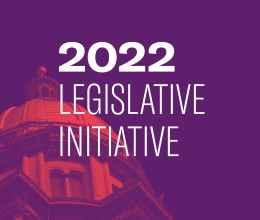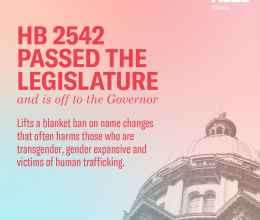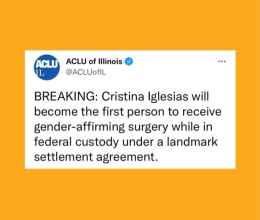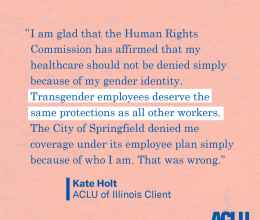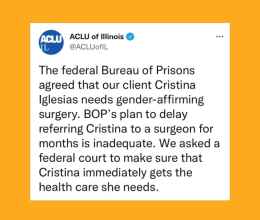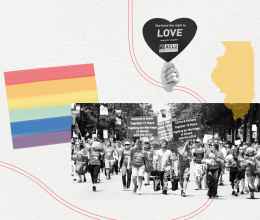
The ACLU’s work on behalf of transgender rights, especially students who are transgender, brings us into contact with advocates from the LGBT community that we have worked with for many years. But we also are working with new partners, with special expertise and understanding of the issues faced by people who are transgender. One such organization is the Gender and Sex Development Program at the Ann & Robert H. Lurie Children’s Hospital of Chicago. The program, which provides a holistic set of services to young people who are transgender and their families, has been in operation for three years. Recently, we interviewed Dr. Robert Garofalo, the co-director of the Program, to discuss his work and the needs of transgender youth.
ACLU: Has anything surprised you about doing this work?
Dr. Garofalo: When Lurie’s stepped into this space three years ago, there was no way that we imagined ourselves on the front lines of the next great LGBT civil rights battle over the use of bathrooms and locker rooms by young people who are transgender. We believed that we were meeting a need for medical services, but have increasingly found ourselves involved in advocacy—helping policy-makers and the public come to understand that the notion of a binary determination of gender is antiquated. Once people are able to understand and embrace that notion, it is so much easier to accept, as an example, that it is critical for a young woman who is transgender to be permitted to use the bathroom and locker room with other girls—that denying her that use actually undermines her identity. So, in many ways, our work advocating for changes to public policy has been a natural evolution based on our work for specific patients.
ACLU: When you describe the holistic services that you provide to young people who are transgender and their families, what are those services?
Dr. Garofalo: We were fortunate in creating the program to have the support of the Tawani Foundation, which enabled us to put in place from the outset a comprehensive list of services for young people and their families. We have general pediatricians, endocrinologists, urologists, psychiatrists, psychologists and nursing staff that can provide a range of services to young people and their families. One thing that we saw from the outset was that many families did not know where to go to get services for a child who was transgender and might not have thought of the traditional LGBT health care providers, because the parents were not integrated into that community. We have created a warm, comfortable and supportive environment in which families can obtain a range of services in a holistic way, so that the medical and other professionals are talking and consulting with one another. One element that has emerged as incredibly important is our nursing services, where families often find assistance in dealing with insurance denials. Some of these treatments are very expensive and should be covered by health insurance, but it can be a process that is difficult to navigate.
ACLU: What do you think are the myths that some members of the general public do not understand about people who are transgender, especially young people who are transgender?
Dr. Garofalo: The biggest issue for me is the number of people who do not understand that gender identity is different from the anatomical sex assigned to someone at birth. The more research we do in this area and the more we understand about human brain function, we know that gender identity results from a great many factors – not just anatomy. It is exasperating that the people who most virulently reject this notion have not really considered the human beings—especially the children—who are involved. When I hear people criticize our work, for example, I think it strange that they are not able to recognize that we are simply helping the well-being of the children that we serve. It also is painful as a clinician to see when groups or individuals, for example, purposefully mis-gender a student who is transgender. This intentional mis-labeling is really nothing more than a form of bullying, designed to demean the individual and create strife. I often wish that the people who engage in this behavior would just take the time to meet and get to know some of our clients. It would really change their views.
ACLU: How would you describe the children and the families you work with?
Dr. Garofalo: They are resilient and remarkable. The families also are incredible. Like my colleagues in this program, I do not think most of the parents who come through our doors believed that they would be part of the next great LGBT civil rights battle after the freedom to marry was affirmed by the Supreme Court. But once the parents understood that was the landscape, the entire family often jumps in full force. And, these parents are incredible advocates for their children and for all young people who are transgender. That is rewarding and fulfilling to see.
ACLU: What is your hope for the future?
Dr. Garofalo: My real hope is that in just a few years the care that we provide will be viewed not as specialized or remarkable, but just routine. The children and families we serve simply should be treated like every other family.
